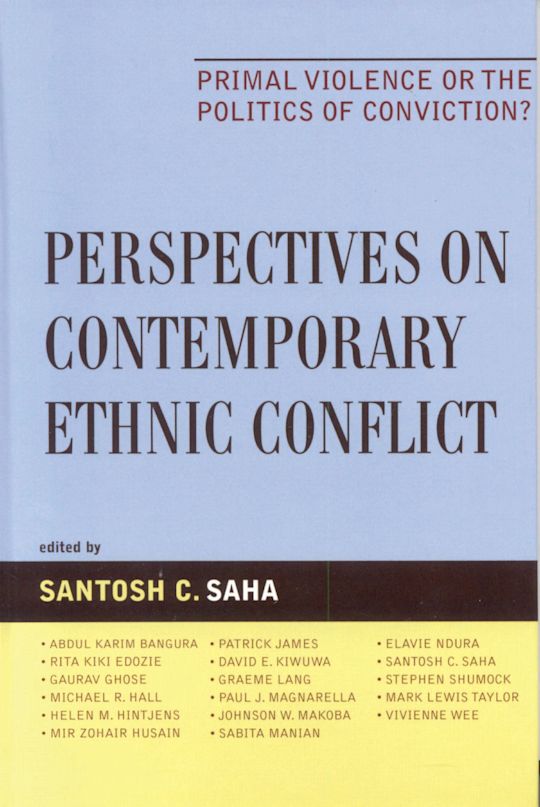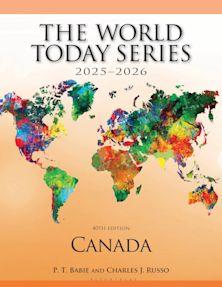- Home
- ACADEMIC
- History
- History - Other
- Perspectives on Contemporary Ethnic Conflict
Perspectives on Contemporary Ethnic Conflict
Primal Violence or the Politics of Conviction?
Santosh C. Saha (Anthology Editor) , Abdul Karim Bangura (Contributor) , Rita Kiki Edozie (Contributor) , Gaurav Ghose (Contributor) , Michael R. Hall (Contributor) , Helen M. Hintjens (Contributor) , Mir Zohair Husain (Contributor) , Patrick James (Contributor) , David Emmanuels Kiwuwa (Contributor) , Graeme Stuart Lang (Contributor) , Paul J. Magnarella (Contributor) , Sabita Manian (Contributor) , Johnson W. Makoba (Contributor) , Elavie Ndura (Contributor) , Stephen Shumock (Contributor) , Mark Lewis Taylor (Contributor) , Vivienne Wee (Contributor)
Perspectives on Contemporary Ethnic Conflict
Primal Violence or the Politics of Conviction?
Santosh C. Saha (Anthology Editor) , Abdul Karim Bangura (Contributor) , Rita Kiki Edozie (Contributor) , Gaurav Ghose (Contributor) , Michael R. Hall (Contributor) , Helen M. Hintjens (Contributor) , Mir Zohair Husain (Contributor) , Patrick James (Contributor) , David Emmanuels Kiwuwa (Contributor) , Graeme Stuart Lang (Contributor) , Paul J. Magnarella (Contributor) , Sabita Manian (Contributor) , Johnson W. Makoba (Contributor) , Elavie Ndura (Contributor) , Stephen Shumock (Contributor) , Mark Lewis Taylor (Contributor) , Vivienne Wee (Contributor)
You must sign in to add this item to your wishlist. Please sign in or create an account
Description
The existing traditions of inquiry into ethnic conflict can be classified into four categories: essentialism, instrumentalism, constructivism, and institutionalism. All four traditions have a distinguished lineage, but none can really account for the worldwide spread of ethnic violence. We need to move from the local to the macro or global. This book, using methodology from sociology, history, and politics, will present the complexities of ethnic conflict in terms of lingusitics, religion, territory, and tribes in various regions. These brilliant essays look at some of the most conflicted sites in the world, where ethnic violence has been created and played out: Burma, Indonesia, Rwanda, Burundi, Nigeria, the Sudan, Mexico, and Guyana. Divided into two parts, Perspectives on Contemporary Ethnic Conflict is a rich text for scholars of conflict studies, focusing on the sources and dynamics of ethnic violence and providing descriptions of ethnic conflict across the globe.
Table of Contents
Part 2 Part I: Explaining Ethnic Violence
Chapter 3 Chapter 1: Third-Party Intervention in Ethno-Religious Conflict: Role Theory and the Major Powers of South Asia
Chapter 4 Chapter 2: Ethnic Violence and the Loss of State Legitimacy: Burma and Indonesia in a Context of Post-colonial Developmentalism
Chapter 5 Chapter 3: Not Ethnicity, but Race: Unity and Conflict in Rwanda since the Genocide
Chapter 6 Chapter 4: The Hutu-Tutsi Conflict in Rwanda
Chapter 7 Chapter 5: Politico-Psychological Dimensions of Ethnic and Poltical Conflicts in India: Conflicting Paradigms at Work
Part 8 Part II: Contemporary Regional Ethnic Conflict
Chapter 9 Chapter 6: Multifaceted Ethnic Conflicts and Conflict Resolution in Nigeria
Chapter 10 Chapter 7: George Town Shuffle: Ethnic Politics of Afro-Guyanese, Amerindians, and Indo-Guyanese in Postcolonial Guyana
Chapter 11 Chapter 8: Sudan's Identity Wars and Democratic Route to Peace
Chapter 12 Chapter 9: Ethnic Conflict in Mexico: The Zapatistas
Chapter 13 Chapter 10: Kurdish Ethnonationalism: A Critical Analysis
Chapter 14 Chapter 11: The Roots of Contemporary Ethnic Conflict and Violence in Burundi
Product details
| Published | 25 May 2006 |
|---|---|
| Format | Ebook (Epub & Mobi) |
| Edition | 1st |
| Extent | 352 |
| ISBN | 9780739158777 |
| Imprint | Lexington Books |
| Publisher | Bloomsbury Publishing |
About the contributors
Reviews
-
This volume is a new path-breaking enterprise both in normative and empirical terms. It is indispensable for public policy makers, diplomats, strategic community and scholars engaged in mind boggling excercises to deal with the complex ethno-political and ethno-religious conflicts with an aim to transform the anarchical world order into a safe, secure and peaceful world.
B. M. Jain, University of Rajasthan, India
-
A timely volume that helps open our eyes to the reality of ethnic violence which afflicts virtually every country in the world today. One of its many contributions is the implicit warning it gives to those who exaggerate the virtues of multiculturalism. It makes us wonder which is stronger: ethnocenrism or muticulturalism?
Anthony Parel, University of Calgary


































